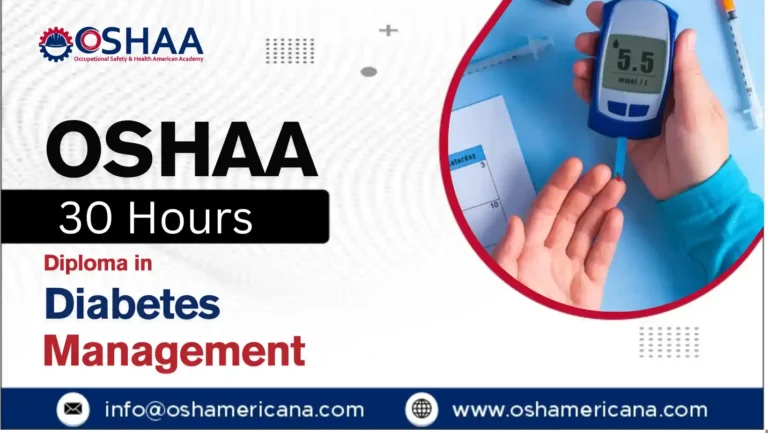The field of physical therapy plays a crucial role in the healthcare sector, offering rehabilitative support to individuals recovering from injuries, surgeries, or chronic conditions. A Physical Therapy Aide is a key professional in this domain, assisting therapists and ensuring patients receive optimal care. The OSHAA 30-Hours Diploma in Physical Therapy Aide is designed to provide foundational knowledge and practical skills required for this role, opening doors to a fulfilling career in healthcare.
The OSHAA 30-Hours Diploma in Physical Therapy Aide is a structured training program aimed at individuals seeking to enter the field of physical therapy support services. This diploma covers essential aspects of patient care, therapeutic techniques, and safety procedures, ensuring graduates are well-prepared for the workplace. The program is ideal for those looking to build a career in healthcare without committing to extensive higher education.
The OSHAA 30-Hours Diploma in Physical Therapy Aide is an excellent choice for those looking to begin a career in the healthcare industry. With its comprehensive curriculum, practical training, and emphasis on workplace safety, this diploma equips students with the necessary skills to thrive in the field. Whether you are a recent school leaver or considering a career change, this program offers a practical and rewarding pathway into physical therapy assistance.
OSHAA 30-Hours Diploma in Physical Therapy Aide
Study Units
Learning Outcomes
Introduction to Physical Therapy Aide and Healthcare Environment (3 Hours)
- Understand the role of a physical therapy aide within healthcare settings
- Identify different healthcare environments where physical therapy services are provided
- Recognise the scope of practice and limitations of a physical therapy aide
- Describe the importance of teamwork and collaboration in physiotherapy
Roles, Responsibilities, and Ethics in Physiotherapy (5 Hours)
- Explain the key responsibilities of a physical therapy aide in patient care
- Understand ethical considerations and patient rights in physiotherapy practice
- Identify professional standards and legal regulations governing physical therapy aides
- Demonstrate appropriate workplace conduct and confidentiality principles
Medical Terminology and Basic Anatomy (3 Hours)
- Understand commonly used medical and physiotherapy terminology
- Identify key anatomical structures relevant to physical therapy
- Explain the functions of the musculoskeletal and nervous systems
- Recognise common injuries and conditions treated in physiotherapy
Patient Care, Communication, and Professionalism (4 Hours)
- Demonstrate effective communication skills with patients and healthcare teams
- Understand patient-centred care and techniques for building rapport
- Recognise cultural sensitivity and patient diversity in healthcare
- Exhibit professional behaviour and interpersonal skills in clinical settings
Safety, Infection Control, and Emergency Procedures (3 Hours)
- Apply infection control measures to maintain a hygienic therapy environment
- Understand safety protocols for handling patients and equipment
- Identify emergency situations and appropriate response procedures
- Recognise workplace hazards and implement preventive measures
Patient Positioning, Mobility, and Transfer Techniques (5 Hours)
- Demonstrate correct body mechanics for safe patient handling
- Assist patients with mobility aids such as walkers and wheelchairs
- Apply proper positioning techniques for patient comfort and therapy effectiveness
- Prevent injuries through safe transfer and lifting techniques
Rehabilitation Techniques and Use of Therapy Equipment (4 Hours)
- Understand the basic principles of rehabilitation and recovery
- Assist with therapeutic exercises under supervision
- Identify and safely operate common physiotherapy equipment
- Support patients in performing prescribed rehabilitation activities
Pain Management, Exercise Therapy, and Treatment Modalities (3 Hours)
- Recognise different pain management strategies used in physiotherapy
- Assist patients with basic exercise therapy programs
- Understand the role of heat, cold, and electrical stimulation in treatment
- Support therapists in implementing treatment modalities safely
Let me know if you need any refinements!
- Quick Entry into the Healthcare Field – Gain essential skills in just 30 hours, allowing for a faster transition into a healthcare support role.
- Comprehensive and Industry-Relevant Training – Covers key areas such as patient care, rehabilitation techniques, safety protocols, and medical terminology to ensure job readiness.
- Career Advancement Opportunities – Serves as a stepping stone to more advanced roles in physiotherapy, rehabilitation, and other healthcare fields.
- Hands-on Practical Skills – Provides practical training in patient mobility, therapy equipment usage, and communication, enhancing employability.
- Improved Job Prospects – Qualifies you for entry-level positions in hospitals, rehabilitation centres, private clinics, and home healthcare settings.
- Flexible Learning Options – Many institutions offer online, in-person, or hybrid formats, making it accessible for working professionals and students.
- Enhanced Patient Care Knowledge – Equips participants with the ability to assist in pain management, exercise therapy, and patient mobility support.
- Stronger Communication and Teamwork Skills – Teaches effective patient interaction, collaboration with healthcare professionals, and workplace professionalism.
- Emphasis on Safety and Ethics – Ensures understanding of infection control, emergency procedures, and ethical considerations in physiotherapy.
- Pathway for Further Education – Can be used as a foundation for advanced studies in physiotherapy, sports rehabilitation, or occupational therapy.
- Aspiring Healthcare Professionals – Individuals looking to start a career in the healthcare sector with a focus on physiotherapy support.
- Students and Recent Graduates – Those interested in gaining foundational knowledge in physiotherapy and rehabilitation before pursuing further studies.
- Career Changers – Professionals from other industries seeking a rewarding career in healthcare with minimal training time.
- Healthcare Assistants and Caregivers – Individuals already working in patient care roles who want to enhance their skills in physiotherapy support.
- Fitness and Sports Enthusiasts – Trainers, coaches, or individuals interested in rehabilitation techniques for injury recovery and prevention.
- Nursing and Allied Health Students – Those studying related healthcare fields who want to expand their expertise in physical therapy assistance.
- Volunteers and Community Workers – Individuals involved in elderly care, disability support, or rehabilitation services who want to improve their skills.
- Anyone Interested in Physiotherapy – People with a passion for helping others regain mobility and improve their quality of life through therapy support.







